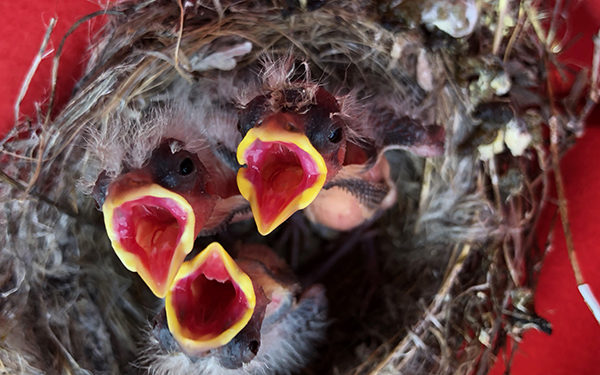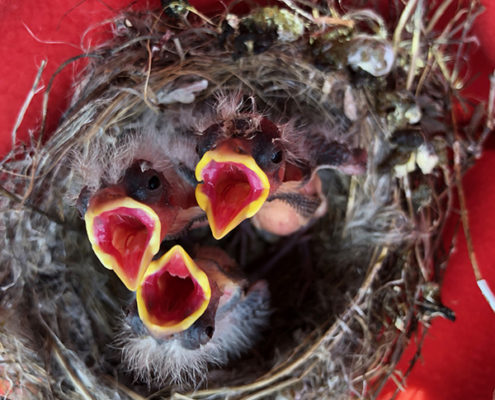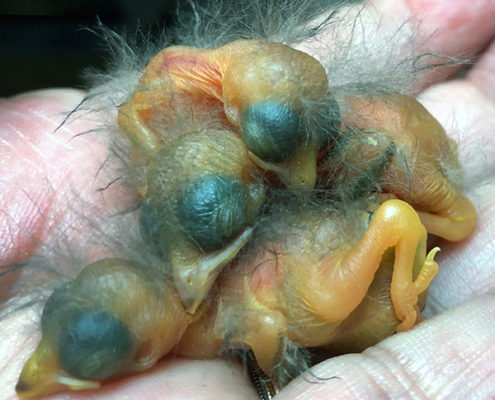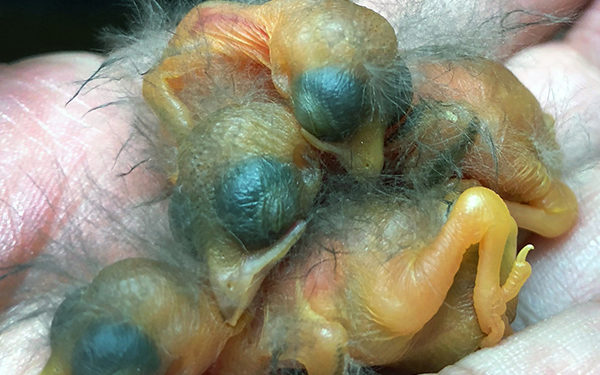Baby Birds
Description
“I touched a baby bird. Now the parents will reject it!”
FALSE: Birds do not have a keen a sense of smell like mammals do. Furthermore, raising baby birds is a huge investment for bird parents, and the commitment to their young is very strong. Parent birds will not abandon their young because you have touched them. They will abandon their young however if you, your pets, or children, frequently disturb the nest or the young. When reuniting baby birds with their parents. It should be done quickly, while observing from a distance. Keep pets indoors during this time to minimize disturbance.
What to do when you find baby birds
Baby wild animals are extremely vulnerable. Knowing the right thing to do when you find an orphaned baby bird can make the difference between life and death. The assumption that the bird is orphaned, abandoned, or should be given food and water often causes harm. The following guidelines have been developed to help you evaluate whether the animals you see need help, and if so, what kind of help they need.
Shannon Jacobs guide: Found a Baby Bird – Now What?
When do baby birds need help?
Season: May – August
Clutch Size: 2-8 eggs
Normal: During baby bird season, it is normal to see young birds on the ground, unable to fly. Often the size of adults but with shorter tail feathers, these are fledglings. Fledglings have fully developed legs, and are able to hop or jump, but are still flightless. Sometimes they will open their mouths when approached by humans. Do not feed or handle these birds. Generally the parent(s) are close by, and if you observe from an indoor vantage point for an hour or so, they will visit their fledglings to feed them. If the bird is in immediate danger, it is ok to gently lift the bird onto a higher branch nearby, out of reach of cats or other predators. Parent birds spend a great deal of time away from the nest. Do not assume the young are abandoned. Watch for three hours from an indoor vantage point to determine if the bird is orphaned before you intervene.
Needs Help: Naked birds (without feathers), require a rehabilitators help if found outside their nest, or if they are cold to the touch. Any bird that had contact with a pet, or has cuts will need to come to a rehabilitator for medical treatment. Remember… even if you cannot reach a rehabilitator overnight, DO NOT OFFER FOOD OR WATER. A hypothermic (cold) bird will die from food or water, and babies are prone to inhaling rather than swallowing. Keep the bird(s) warm, dark, quiet, and covered until you can reach a rehabilitator.
What to do when you find…
Ducklings or Goslings
Season: April – June
Clutch Size: 8-12 eggs
Normal: Ducklings and goslings often will be observed crossing roadways in line behind their mother. Occasionally, one or two chicks may be substantially smaller than the others.
May Need Help: Ducklings or goslings are prone to falling into storm drains and window wells. Chicks found stranded in a pit or drain should be removed and placed into a box. Once the entire group is collected, they will often by accepted by the mother if presented as a group. Use the box of cheeping babies to lure mom away to a safer location, then release all chicks at once. If mom is nowhere in sight, place the box in a dark, warm, quiet room and contact a rehabilitator immediately. (Please note that for most ducks, only the female cares for the young.) Please minimize contact with these birds!
Important!
A duckling or gosling should NEVER be placed into water. Without mom, the baby will get cold and may quickly die. Do not offer them food or water.
Help! I Found a Baby Bird reprinted courtesy of Wild Care Cape Cod.




